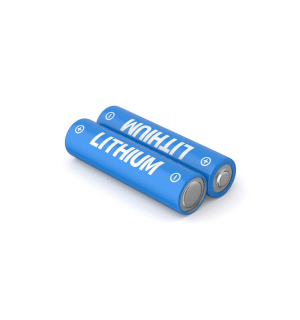Lithium batteries have become increasingly popular in recent years due to their numerous advantages over traditional battery technologies. They offer high energy density, longer lifespan, faster charging capabilities, and are lightweight and compact. In this article, we will explore the pros and cons of lithium batteries, their applications, cost analysis, and environmental impact, and ultimately determine if they are worth investing in. So, are lithium batteries worth it? Let’s find out.
Batteries are an essential component in our modern lives, powering various devices and systems that we rely on daily. Among the different types of batteries available, lithium batteries have gained significant attention due to their exceptional performance and versatility. These batteries utilize lithium ions to store and release electrical energy efficiently.
In this article, we explore the worthiness of lithium batteries, focusing on their advantages, disadvantages, applications, cost analysis, and environmental impact. Lithium batteries offer high energy density, longer lifespan, faster charging, and are lightweight and compact. They find applications in electronics, electric vehicles, and renewable energy storage. While they may have a higher initial cost and safety concerns, their overall benefits, such as cost savings and environmental friendliness, make them a worthwhile investment in the modern world.
Advantages of Lithium Batteries
High Energy Density
Lithium batteries have a remarkable energy density, which means they can store a substantial amount of energy in a compact size. This makes them ideal for portable electronics and devices that require a long-lasting power source. Compared to traditional lead-acid batteries, lithium batteries can store up to three times more energy.
Longer Lifespan
One of the key advantages of lithium batteries is their extended lifespan. They can typically last two to three times longer than other battery technologies, such as nickel-cadmium or nickel-metal hydride batteries. This longevity reduces the need for frequent battery replacements, saving both money and resources in the long run.

Faster Charging
Lithium batteries offer faster charging capabilities compared to other battery types. They can efficiently absorb and store energy during the process, allowing devices and vehicles to be ready for use in a shorter amount of time. This is particularly beneficial for electric vehicles and portable electronic devices that require quick recharging.
Lightweight and Compact
Lithium batteries are significantly lighter and more compact than their counterparts, making them highly desirable for applications where weight and size are crucial factors. This advantage is particularly evident in the aerospace industry, where the weight of the batteries directly impacts fuel efficiency and overall performance.
Environmentally Friendly
Compared to traditional battery technologies, lithium batteries are considered more environmentally friendly. They do not contain toxic metals like lead or cadmium, which pose serious risks to human health and the environment. Additionally, lithium batteries can be recycled, reducing the overall environmental impact and promoting sustainability.
Disadvantages of Lithium Batteries
Initial Cost
One of the main drawbacks of lithium batteries is their initial cost. They tend to be more expensive upfront compared to other battery technologies. However, it’s important to consider the long-term cost savings associated with their extended lifespan and higher energy density, which can offset the initial investment.
Limited Availability
Although lithium is a relatively abundant element, the demand for lithium batteries has been increasing rapidly, which has led to concerns about future availability. However, efforts are being made to expand lithium mining and production to meet the growing demand.
Safety Concerns
While lithium batteries are generally safe to use, there have been rare cases of thermal runaways, which can lead to battery fires or explosions. Manufacturers have implemented safety measures, such as advanced battery management systems, to minimize these risks. It is crucial to handle lithium batteries with care and follow proper usage guidelines.
Applications of Lithium Batteries
Electronics and Portable Devices
Lithium batteries have revolutionized the electronics industry by powering a wide range of devices, including smartphones, laptops, tablets, and wearables. Their high energy density and longer lifespan make them ideal for providing extended usage time in compact and lightweight devices.
Electric Vehicles
The automotive industry has embraced lithium batteries as a key component in electric vehicles (EVs). These batteries offer the energy storage capacity required for longer driving ranges, quicker acceleration, and faster charging times. As the demand for EVs continues to grow, lithium batteries play a vital role in enabling sustainable transportation.
Renewable Energy Storage
Lithium batteries are crucial for storing renewable energy generated from sources like solar panels and wind turbines. They allow for efficient energy storage, reducing reliance on the electrical grid and promoting the use of clean and sustainable power sources.
Cost Analysis
When considering the worthiness of lithium batteries, it is important to analyze the overall cost. While they may have a higher initial price compared to other batteries, long-term cost savings should be taken into account. With their extended lifespan and higher energy density, lithium batteries can provide significant cost benefits over time, making them a worthwhile investment.
Environmental Impact
Lithium batteries offer several environmental advantages. Their higher energy density reduces the overall carbon footprint associated with battery production and usage. Additionally, lithium batteries can be recycled, allowing for the recovery of valuable materials and minimizing waste. Proper recycling and disposal practices are essential to maximize the environmental benefits of lithium batteries.
Resolution
Lithium batteries provide numerous advantages, including high energy density, longer lifespan, faster charging, and compact size. They have revolutionized various industries, including electronics, transportation, and renewable energy storage. While they may come with a higher initial cost and safety considerations, their overall benefits outweigh the drawbacks. With the increasing demand for portable power and sustainable energy solutions, lithium batteries are indeed worth the investment.
FAQs
Are Lithium Batteries Safe to Use?
Lithium batteries are generally safe to use when handled correctly and used within their specified limits. However, it is essential to follow proper usage guidelines and avoid mishandling or exposing them to extreme conditions.
How Long Do Lithium Batteries Last?
Lithium batteries typically have a longer lifespan compared to other battery technologies, lasting two to three times longer. The actual lifespan can vary depending on factors such as usage patterns, charging cycles, and operating conditions.
Can Lithium Batteries be Recycled?
Yes, lithium batteries can be recycled. Recycling allows for the recovery of valuable materials like lithium, cobalt, and nickel, reducing the need for mining raw materials and minimizing environmental impact.
Are Lithium Batteries More Expensive Than Other Types?
Lithium batteries generally have a higher upfront cost compared to other battery technologies. However, their extended lifespan and higher energy density often result in long-term cost savings, making them a worthwhile investment.
What are the Alternatives to Lithium Batteries?
While lithium batteries are currently the dominant technology, alternative battery types such as solid-state batteries and flow batteries are being developed. These technologies aim to address some of the limitations of lithium batteries and offer additional benefits in terms of safety, energy density, and scalability.

